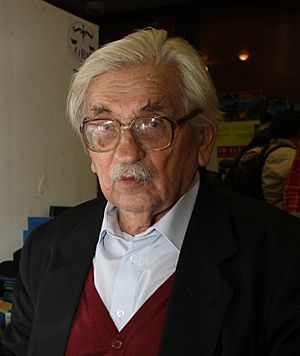The Two Thousand Words facts for kids

The Two Thousand Words (full title: 2000 Words to Workers, Farmers, Officials, Scientists, Artists, and Everyone) was an important paper. It was written by Ludvík Vaculík, a writer from Czechoslovakia. Many smart people and artists signed it on June 17, 1968. This happened during a time called the Prague Spring. The Prague Spring was a period when Czechoslovakia became more open and free. It started in January 1968 when Alexander Dubček became a leader. The Prague Spring ended in August when the Soviet Union invaded. After that, a period called Normalization began.
What Did the Manifesto Say?
The "Two Thousand Words" was a call for the people of Czechoslovakia. It asked them to make their government more open and honest. It was not a call for a big revolution.
Vaculík started by explaining how the country had struggled. This happened under the Communist Party of Czechoslovakia (KSČ). He said the country faced moral and economic problems. Workers felt they had no say in their own lives.
He wrote that most people stopped caring about public matters. They only worried about themselves and their money. He also said that money could not even be trusted anymore. Relationships between people were hurt. People did not enjoy working. He felt the country's spirit and character were damaged.
Vaculík praised some members of the KSČ. These were "democratically-minded" people who wanted change. He said they were able to share new ideas from inside the party. He explained that these ideas were not new. Instead, weak leaders and widespread unfairness made more people realize their situation.
Instead of completely changing the party, Vaculík suggested supporting its progressive side. He said this side had good organizations and experienced officials. He believed they held the power to make things happen.
He said that during this time of change, people should ask for clear information. This included how money was managed. He also urged people to elect "capable and honest people" as their leaders. He wanted them to use legal and peaceful protests. This would help remove corrupt officials. He also believed a free press was important. He called for newspapers controlled by the party to become open platforms. These platforms would be for all good ideas.
The Soviet Union later criticized this statement. They said it challenged their leading role. Vaculík only hinted at the USSR. He called them "foreign forces." He suggested a slow and careful path to equal relations. He believed Czechoslovakia could achieve this by improving itself. He wanted the country to revive so much that one day people could elect brave and talented leaders. These leaders would then create and keep good relations with other countries. Overall, Vaculík wanted to renew socialism from within. He believed this could happen with strong oversight from an empowered population.
How Did People React?
The "Two Thousand Words" energized many people who wanted progress. But it also caused a lot of division. It gave a reason for those who wanted to keep things the same to fight back. Because of this, Vaculík was later banned from the party.
The party leaders met right away in an emergency meeting. This meeting only made more people support the statement at home. Government leaders quickly spoke out against the statement. Even Dubček spoke on television a few days later. He asked for the country to be united.
Two weeks later, I. Aleksandrov criticized the "Two Thousand Words." This was in the Moscow newspaper Pravda. He called it a plan by groups trying to undo Czechoslovakia's history since 1948. He said they wanted to discredit the Czechoslovak Communist Party. He also said they wanted to harm the friendship between Czechoslovakia and other socialist countries. He believed they wanted to prepare the way for a counter-revolution.
The statement did not cause much local action. But it made it harder for Czech diplomats like Josef Smrkovský to calm the Soviets. The Soviets were worried about how fast reforms were happening in Czechoslovakia. In the end, the "Two Thousand Words" was one of the reasons that led to the Soviet invasion of Czechoslovakia in mid-August.
 | Ernest Everett Just |
 | Mary Jackson |
 | Emmett Chappelle |
 | Marie Maynard Daly |

